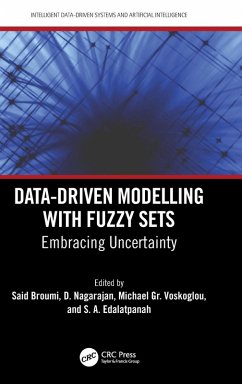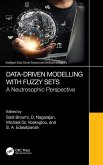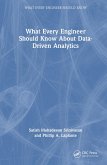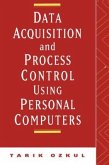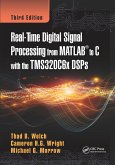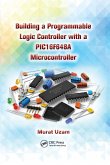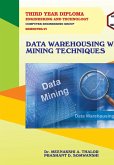Data-Driven Modelling with Fuzzy Sets
Embracing Uncertainty
Herausgeber: Broumi, Said; Voskoglou, Michael Gr.; Nagarajan, D.
Data-Driven Modelling with Fuzzy Sets
Embracing Uncertainty
Herausgeber: Broumi, Said; Voskoglou, Michael Gr.; Nagarajan, D.
- Gebundenes Buch
- Merkliste
- Auf die Merkliste
- Bewerten Bewerten
- Teilen
- Produkt teilen
- Produkterinnerung
- Produkterinnerung
This book presents recent theoretical advances and applications of fuzzy sets and their extensions to Science, Humanities and Education.
Andere Kunden interessierten sich auch für
![Data-Driven Modelling with Fuzzy Sets Data-Driven Modelling with Fuzzy Sets]() Data-Driven Modelling with Fuzzy Sets206,99 €
Data-Driven Modelling with Fuzzy Sets206,99 €![Big Data and Edge Intelligence for Enhanced Cyber Defense Big Data and Edge Intelligence for Enhanced Cyber Defense]() Big Data and Edge Intelligence for Enhanced Cyber Defense152,99 €
Big Data and Edge Intelligence for Enhanced Cyber Defense152,99 €![What Every Engineer Should Know About Data-Driven Analytics What Every Engineer Should Know About Data-Driven Analytics]() Satish Mahadevan SrinivasanWhat Every Engineer Should Know About Data-Driven Analytics174,99 €
Satish Mahadevan SrinivasanWhat Every Engineer Should Know About Data-Driven Analytics174,99 €![Data Acquisition and Process Control Using Personal Computers Data Acquisition and Process Control Using Personal Computers]() OzkulData Acquisition and Process Control Using Personal Computers402,99 €
OzkulData Acquisition and Process Control Using Personal Computers402,99 €![Real-Time Digital Signal Processing from MATLAB to C with the TMS320C6x DSPs Real-Time Digital Signal Processing from MATLAB to C with the TMS320C6x DSPs]() Thad B. WelchReal-Time Digital Signal Processing from MATLAB to C with the TMS320C6x DSPs104,99 €
Thad B. WelchReal-Time Digital Signal Processing from MATLAB to C with the TMS320C6x DSPs104,99 €![Building a Programmable Logic Controller with a PIC16F648A Microcontroller Building a Programmable Logic Controller with a PIC16F648A Microcontroller]() Murat UzamBuilding a Programmable Logic Controller with a PIC16F648A Microcontroller94,99 €
Murat UzamBuilding a Programmable Logic Controller with a PIC16F648A Microcontroller94,99 €![DATA WAREHOUSING WITH MINING TECHNIQUES (22621) DATA WAREHOUSING WITH MINING TECHNIQUES (22621)]() MeenakshiA. ThalorDATA WAREHOUSING WITH MINING TECHNIQUES (22621)22,99 €
MeenakshiA. ThalorDATA WAREHOUSING WITH MINING TECHNIQUES (22621)22,99 €-
-
-
This book presents recent theoretical advances and applications of fuzzy sets and their extensions to Science, Humanities and Education.
Hinweis: Dieser Artikel kann nur an eine deutsche Lieferadresse ausgeliefert werden.
Hinweis: Dieser Artikel kann nur an eine deutsche Lieferadresse ausgeliefert werden.
Produktdetails
- Produktdetails
- Verlag: CRC Press
- Seitenzahl: 348
- Erscheinungstermin: 17. Juli 2024
- Englisch
- Abmessung: 240mm x 161mm x 23mm
- Gewicht: 687g
- ISBN-13: 9781032550107
- ISBN-10: 1032550104
- Artikelnr.: 70147167
- Herstellerkennzeichnung
- Libri GmbH
- Europaallee 1
- 36244 Bad Hersfeld
- gpsr@libri.de
- Verlag: CRC Press
- Seitenzahl: 348
- Erscheinungstermin: 17. Juli 2024
- Englisch
- Abmessung: 240mm x 161mm x 23mm
- Gewicht: 687g
- ISBN-13: 9781032550107
- ISBN-10: 1032550104
- Artikelnr.: 70147167
- Herstellerkennzeichnung
- Libri GmbH
- Europaallee 1
- 36244 Bad Hersfeld
- gpsr@libri.de
Said Broumi is serving as an Assistant Professor at Regional Center for the Professions of Education and Training, Casablanca-Settat, Morocco. Dr. Broumi Said completed his MSc and PhD in Computer Science from University of Hassan II of Casablanca, Morocco. He is permanent member at Laboratory of Information Processing, Faculty of Science Ben M'Sik, University Hassan II, Casablanca, Morocco. His research interests are in the field of graph theory, extended fuzzy graphs, decision analysis and neutrosophic theory. He has diversity in his research work. He has published several works on neutrosophic graph theory, soft set theory, multi-attribute decision analysis and some alternative theories of Neutrosophic Mathematics. He has published more than 200 research articles in international peer-reviewed ISI Indexed /Impact factor journals. Some of his papers have been published in high impact journals including, Complex & Intelligent Systems, Computational and Applied Mathematics, Symmetry, and Journal of Neutrosophic Set and Systems. His work has largely been cited and total citation is more than 5992 (Scholar Google, H-index 41). He has presented his research work at some national as well as international conferences. He has been acting as a reviewer for a number of international journals. He is also an Editor in chief of the following journals: 1. International Journal of Neutrosophic Set and Systems 2. International Journal of Neutrosophic Science Dr. D. Nagarajan is a Professor in the Department of Mathematics, Rajalakshmi Institute of Technology, Chennai, India. He received his Ph.D., from Manonmaniam Sundaranar University,2007. He has a total of twenty-three years of experience in both academia and research National as well as International Institutions. He has published 110 research articles in international reputed journals as well as serving as a reviewer for many peers reviewed journals. He has two patents on his credit.His research interests include Stochstic processes ,Fuzzy sets and system, Neutrosophic control systems and image processing. He is also associated with various educational and research societies, like IMS, ISTE, IAENG, AMTI and ISRD. He is the Guest editor of 3 Journals, also coauthor of 3 books published by different publishers like Lambert and Notion Press.He is associate editor of Franklin Open journal. Dr. Seyyed Ahmad Edalatpanah is Associate Professor at the Ayandegan Institute of Higher Education, Tonekabon, Iran. S. A. Edalatpanah received his Ph.D. degree in Applied Mathematics from the University of Guilan, Rasht, Iran. He is currently working as the Chief of R&D at the Ayandegan Institute of Higher Education, Iran. He is also an academic member of Guilan University and the Islamic Azad University of Iran. Dr. Edalatpanah's fields of interest include numerical computations, operational research, uncertainty, fuzzy set and its extensions, numerical linear algebra, soft computing, and optimization. He has published over 150 journal and conference proceedings papers in the above research areas. He serves on the editorial boards of several international journals. He is also the Director-in-Charge of the Journal of Fuzzy Extension & Applications. Currently, he is president of "International Society of Fuzzy Set Extensions and Applications" (ISFSEA). Michael Gr. Voskoglou (B.Sc., M.Sc., M.Phil., Ph.D. in Mathematics) is an Emeritus Professor of Mathematical Sciences at the School of Engineering of the Graduate Technological Educational Institute (T. E. I.) of Western Greece, which has recently been joined with the University of Peloponnese. He was a full Professor at the same Institute from 1987 to 2010. He was also an instructor at the Hellenic Open University, at the Mathematics Department of the University of Patras, at the Schools of Primary and Secondary In - Service Teachers' Training in Patras and a teacher of mathematics at the Greek Public Secondary Education (1972-1987). He worked as a Visiting Researcher at the Institute of Mathematics and Informatics of the Bulgarian Academy of Sciences in Sofia for three years (1997-2000), under sabbatical. He has lectured as a Visiting Professor in postgraduate courses at the School of Management of the University of Warsaw (2009), at the Department of Operational Mathematics of the University of Applied Sciences in Berlin (2010) and at the Mathematics Department of the National Institute of Technology of Durgapur (2016) under a grand of the Indian Government. He is the author/editor of 18 books in Greek and in English language and of more than 600 papers published in international journals, book chapters and proceedings of conferences of more than 30 countries in the five continents, with more than 2000 citations from other researchers. He used to be the Editor in Chief of the "International Journal of Applications of Fuzzy Sets and Artificial Intelligence" (2011-2020) and currently he is a reviewer of the American Mathematical Society, Editor in Chief of the journal "Construction, Design, Maintenance" (www.wseas.com/journals/dcm/index.php) and member of the Editorial Board of many other international scientific journals. He has conducted five programs of technological research on applications of quantitative methods to Management (1989-1997), he has supervised many student dissertations, and he was external examiner of Ph.D. dissertations at Universities of Egypt, India and Saudi Arabia. He is the recipient of many scholarships, distinctions and honorary awards and member of many scientific associations (AMS, HMS, ICTMA, IETI, etc.). His research interests include Algebra, Fuzzy Logic, Markov Chains, Artificial Intelligence and Mathematics Education.
1. Integrated Fuzzy Soft FCM Approach in Focused Decision Making. 2.
Optimal Ranking Application of Integrated Fuzzy AHP-SPOTIS MCDM. 3.
Parametric Decision Making in Fuzzy Environment. 4. Distance measures on
trapezoidal intuitionistic fuzzy multi-numbers and application to
multi-criteria decision-making problems. 5. Trapezoidal Fuzzy Multi
Aggregation Operator Based on Archimedean Norms and Their Application to
Multi Attribute Decision-Making Problems. 6. Recent Trends and Advancements
in uncertain Inventory Management. 7. A Comparative Study on Critical Path
Method and Project Evaluation and Review Technique in Construction under
Uncertain Environment. 8. A Short Literature on Linear Programming Problem
under Uncertainty. 9. A Note on Translation of a Bipolar-Valued Fuzzy Sets
in Sheffer Stroke MTL-Algebras. 10. Application of the Greedy
Dhouib-Matrix-TP1 Method to Optimize the Transportation Problem under
Triangular Fuzzy Domain. 11. An approach towards shortest path problems
using the concept of cubical fuzzy information. 12. Different forms of
Linear Dodecagonal Fuzzy Number and its Application. 13. Different Forms of
Non-Linear Dodecagonal Fuzzy Number and its Application. 14. Applications
of Vague Sets in Solving a Vague Transportation Model. 15. A fuzzy Ishikawa
diagram to represent and evaluate the quality of education. 16. A Novel
Integrated FCM / MCDM Methodology for Evaluating Logistic Performance Index
Optimal Ranking Application of Integrated Fuzzy AHP-SPOTIS MCDM. 3.
Parametric Decision Making in Fuzzy Environment. 4. Distance measures on
trapezoidal intuitionistic fuzzy multi-numbers and application to
multi-criteria decision-making problems. 5. Trapezoidal Fuzzy Multi
Aggregation Operator Based on Archimedean Norms and Their Application to
Multi Attribute Decision-Making Problems. 6. Recent Trends and Advancements
in uncertain Inventory Management. 7. A Comparative Study on Critical Path
Method and Project Evaluation and Review Technique in Construction under
Uncertain Environment. 8. A Short Literature on Linear Programming Problem
under Uncertainty. 9. A Note on Translation of a Bipolar-Valued Fuzzy Sets
in Sheffer Stroke MTL-Algebras. 10. Application of the Greedy
Dhouib-Matrix-TP1 Method to Optimize the Transportation Problem under
Triangular Fuzzy Domain. 11. An approach towards shortest path problems
using the concept of cubical fuzzy information. 12. Different forms of
Linear Dodecagonal Fuzzy Number and its Application. 13. Different Forms of
Non-Linear Dodecagonal Fuzzy Number and its Application. 14. Applications
of Vague Sets in Solving a Vague Transportation Model. 15. A fuzzy Ishikawa
diagram to represent and evaluate the quality of education. 16. A Novel
Integrated FCM / MCDM Methodology for Evaluating Logistic Performance Index
1. Integrated Fuzzy Soft FCM Approach in Focused Decision Making. 2.
Optimal Ranking Application of Integrated Fuzzy AHP-SPOTIS MCDM. 3.
Parametric Decision Making in Fuzzy Environment. 4. Distance measures on
trapezoidal intuitionistic fuzzy multi-numbers and application to
multi-criteria decision-making problems. 5. Trapezoidal Fuzzy Multi
Aggregation Operator Based on Archimedean Norms and Their Application to
Multi Attribute Decision-Making Problems. 6. Recent Trends and Advancements
in uncertain Inventory Management. 7. A Comparative Study on Critical Path
Method and Project Evaluation and Review Technique in Construction under
Uncertain Environment. 8. A Short Literature on Linear Programming Problem
under Uncertainty. 9. A Note on Translation of a Bipolar-Valued Fuzzy Sets
in Sheffer Stroke MTL-Algebras. 10. Application of the Greedy
Dhouib-Matrix-TP1 Method to Optimize the Transportation Problem under
Triangular Fuzzy Domain. 11. An approach towards shortest path problems
using the concept of cubical fuzzy information. 12. Different forms of
Linear Dodecagonal Fuzzy Number and its Application. 13. Different Forms of
Non-Linear Dodecagonal Fuzzy Number and its Application. 14. Applications
of Vague Sets in Solving a Vague Transportation Model. 15. A fuzzy Ishikawa
diagram to represent and evaluate the quality of education. 16. A Novel
Integrated FCM / MCDM Methodology for Evaluating Logistic Performance Index
Optimal Ranking Application of Integrated Fuzzy AHP-SPOTIS MCDM. 3.
Parametric Decision Making in Fuzzy Environment. 4. Distance measures on
trapezoidal intuitionistic fuzzy multi-numbers and application to
multi-criteria decision-making problems. 5. Trapezoidal Fuzzy Multi
Aggregation Operator Based on Archimedean Norms and Their Application to
Multi Attribute Decision-Making Problems. 6. Recent Trends and Advancements
in uncertain Inventory Management. 7. A Comparative Study on Critical Path
Method and Project Evaluation and Review Technique in Construction under
Uncertain Environment. 8. A Short Literature on Linear Programming Problem
under Uncertainty. 9. A Note on Translation of a Bipolar-Valued Fuzzy Sets
in Sheffer Stroke MTL-Algebras. 10. Application of the Greedy
Dhouib-Matrix-TP1 Method to Optimize the Transportation Problem under
Triangular Fuzzy Domain. 11. An approach towards shortest path problems
using the concept of cubical fuzzy information. 12. Different forms of
Linear Dodecagonal Fuzzy Number and its Application. 13. Different Forms of
Non-Linear Dodecagonal Fuzzy Number and its Application. 14. Applications
of Vague Sets in Solving a Vague Transportation Model. 15. A fuzzy Ishikawa
diagram to represent and evaluate the quality of education. 16. A Novel
Integrated FCM / MCDM Methodology for Evaluating Logistic Performance Index

